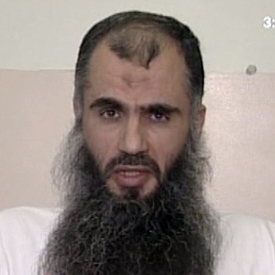‘I want Qatada deported before Olympics,’ says May
Home Secretary Theresa May vows the government “will do everything” possible to deport Abu Qatada before the start of the Olympics, despite a senior judge’s decision to bail the radical Muslim cleric.

Branding the decision as “unacceptable”, Theresa May said: “The right place for a terrorist is a prison cell; the right place for a foreign terrorist is a foreign prison cell far away from Britain.”
Answering an urgent question in the Commons, she said she wanted to be in a position “where we can deport Abu Qatada so he’s not in this country when the Olympics come”.
She added: “We will do everything we can within the existing legal regime to deport Qatada and we’re doing everything we can to reform that regime to avoid these cases in future.”
Mrs May argued that British courts had found Qatada “poses a serious risk to our national security”, has a “long-standing association with al-Qaeda” and provides “religious justification for acts of violence and terror”.
Qatada has been held for six-and-a-half years, more than any other detainee in modern immigration history, while fighting deportation to Jordan.
But he will be released from the maximum security prison where he is being held after applying for bail when human rights judges in Europe ruled he could not be deported without assurances from Jordan that evidence gained through torture would not be used against him.
Mrs May said the government was continuing to consider the case for a British Bill of Rights and the prime minister was leading the case for reform of the Strasbourg-based human rights court.
She added that his bail conditions, which include a 22-hour curfew and strict conditions over whom he can meet, were among “the most stringent imposed for anybody facing deportation from the UK”.
“If any of these conditions are breached, he will be re-arrested and we will seek his immediate re-detention,” Mrs May said.
“But however strict the bail conditions, I continue to believe that Qatada should remain behind bars.
“It simply isn’t acceptable that, after guarantees from the Jordanians about his treatment, after British courts have found he is dangerous, after his removal has been approved by the highest courts in our land, we still cannot deport dangerous foreign nationals.”